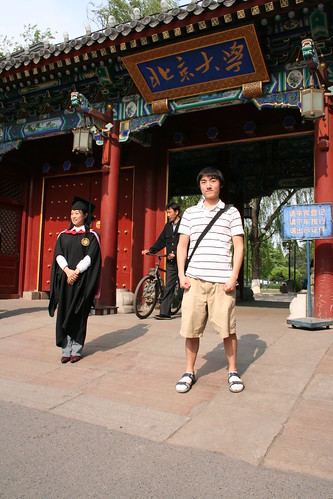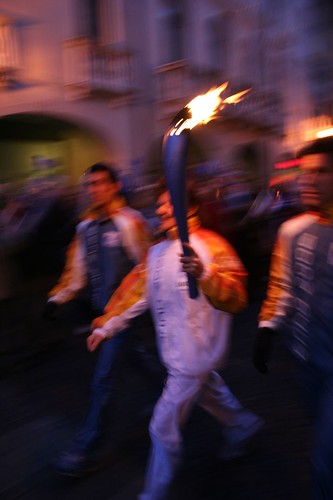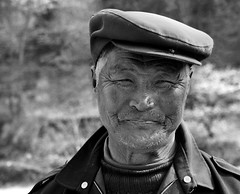Reading China
I am conducting social research about China although I am living in Hong Kong. I take field trip to China occasionally. I want to share with you my fieldnotes, official data, news stories and my reading of them in this blog.
Sunday, April 29, 2007
Saturday, April 28, 2007
A Hotel in Peking University for "Teaching and Research"?

The Peking University is building a five-star hotel. But the teachers and students accuse this project of occupying the university's land for research and teaching and violating the land-use designation in the campus planning.
This hotel, named after "Weiming Lake", the famous spot in the Peking University and located at the northern side of Baiyi Road and by the wall of campus, is still under construction. This is a project of the Peking University Science Park Limited (PUSP). It is scheduled to open in October.
The spokesperson of PUSP defended that hotel is also "a facility of education and research". This hotel will be the first "five-star campus and business hotel" in China. There are blocks of office, hotel rooms and apartment.
In the BBS of the Peking University, there have been a lot of comments on it since April 10. Most users oppose the construction of this hotel. Some argue that this project would make the problem of shortage in land for research and teaching development in the Peking University even worse. Some criticize the name of "Wuming Hotel" as tarnishing the reputation and spirit of the university.
But some support this project. A student from the Faculty of Life Science agrees with the idea of buidling a hotel in university. There is no landmark-like hotel in the Peking University. There is a shortage in space for guest scholars. But he also said that the location is questionable because that piece of land is so valuable.
This piece of land, area of 200 acres, was a part of Chengfu village in Haidian district. In 2003, t was transferred to the use of teaching and education for the Peking University. At that time, it was labelled as "land for teaching and research".
A member of the Beijing Planning Committee said that building hotel in the land for teaching and education is definitely not allowed. But more substantial conclusion will be reached after site visit. Zhang Wei, spokesperson of the Beijing Bureau of National Land and Resource, said that it is a common sense that building hotel on the land for education and research is not illegal without changes in planning.
Source in Chinese
Photo: -shu-
Labels: Beijing, business, education, Peking University
Friday, April 27, 2007
Taiwan opposes Olympic torch

Taiwan government refuses to let the torch of the Beijing's Olympic Games to come to Taiwan. This is the first case of a "National Olympic Committee" (NOC) rejecting Olympic torch in the history.
Yesterday, the International Olympic Committee and Beijing Olympic Committee announced the route of the torch. It is scheduled to go to Taipei from Ho Chi Minh City and then to Hong Kong and Macau. But after the announcement, in a press conference, Taiwan's Sport Committte argued that this route would damage and "dwarf" Taiwan's status as a national sovereignty .
Yang Zhonghe, Chairperson of Sport Committee of Republic of China (ROC), said that this route, from Taiwan, Hong Kong and then to China, gives an impression that Taiwan is one of the stops of the "national route". According to him, the design of this route seems to see Taiwan as the same as Hong Kong, a special administrative region of China. But Yang did not respond if Taiwan will or will not join the Olympic Games next year.
But Cai Zhenwei, Chairperson of the Olympic Committee, ROC, said that the route from Ho Chi Minh City to Taiwan and Hong Kong follows the principle of equality between NOC and NOC. He repeated that this was a problem of "political reading". Cai remarked that the Olympic Committee as a civic organization is helpless that it could only follow government's policy.
Zhang Xiaoyu, vice-chairperson of the Beijing Olympic Committee, said that Taipei, Hong Kong and Macau are part of the route outside China but not "international" line. In February, the Olympic Committee, ROC, reached a consensus with Beijing that the torch could be passed from a third party to Taiwan and then to Hong Kong and Macau. But Taiwan government suddenly overturned it in April and refused to accept the route.
Source: Sergio Maistrello
Labels: China, Olympic games, Taiwan
Thursday, April 26, 2007
Newspapers in China and India
While most newspapers circulation is declining around the world, it is booming in India and China. In India, the daily circulation increased by 33% from 2001 to 2005. China achieved an increase of 28% from 2000 to 2004.
Last year, among the top ten companies with the best stock price performance, there are three and two in India and China respectively. The price of Deccan Chronicle Holdings, the second biggest newspaper in India, skyrocketed by 81%. The stock prices of HT Media, the biggest newspaper corporate group and Jagran Prakashan, the biggest local newspaper, increase by 66% and 56% respectively.
In Chengdu, China, B-Raymedia's profit increased by 20% last year and its stock price doubled. CCID Media, a conglomerate owning six newspapers and ten magazines, tripled its stock price.
Source: Hong Kong Economic Journal (信報), 2007.4.25
Friday, April 20, 2007
Analysis of "Prison Break" from the perspective of Marxist-Leninism

Notes: The following piece of article is written by an anonymous online writer in China. He/she probably wrote it just for fun despite not without any serious intention. He/she borrowed the official rhetorics from the Chinese Communist Party's propaganda and official version of its history.
This TV drama talks about an American young petty bourgeois helping his elder brother framed to jail to escape and (possibly) acquit the charge. It sharply criticizes the evil rule of the capitalist class and attacks the darkness and hypocrisy of the capitalist legal system. It deeply reveals the inevitable historical trend of the capitalist system towards extinction.
The team of escapees is definitely a revolutionary army of fighting against the capitalist system and legal authority. But the team members vary in their purposes and their backgrounds are extremely complicated.
Lincoln is a righteous and good-hearted unemployed proletariat. In order to support his brother’s study, he borrowed from loan shark. It resulted in being exploited by the accomplice of the capitalist class. He was forced to back murder charge and was put to the row of death penalty. He had given up on all resistances against his injustice fate. But with the encouragement by his younger brother, he picked up the pieces and steadily walked on the revolutionary road.
Michael is a highly educated petty bourgeois intellectual. His job was highly paid and very decent. He enjoyed the life of abundance but emptiness until he realized the truth that his brother was set up. He knows clearly the true nature of the dictatorship of the capitalist class. He determined to abandon his petty bourgeois life of luxury and help his brother to get rid of the charge. In the process of escape, he turned into an outstanding revolutionary leader of proletarian revolution and a strong force in the process of revolutionary escape. But due to the complication and difficulty of revolutionary struggles, Michael cleverly adopted the strategy of united front to recruit people from different class backgrounds in solidarity and effectively expanded the revolutionary base.
At the same time, Michael had been threatened by the internal conflict and split within the revolutionary army all the time. He kept alert to the dangers of revisionism and capitulationism. Michael’s political line was fundamentally correct until the first episode of the second season. He united the majority and decisively cleared the traitor (the petty thief) out of the revolutionary army. He appropriately settled down the struggles between different political lines within the party (t-bag vs. Abruzzi). But thereafter, how to guarantee the correct way of revolution is a long-term mission for Michael and a great challenge to his political wisdom.
... ...
Veronica is a petty bourgeois lawyer. For sense of justice and friendship, she worked very hard in searching for evidence to help her former lover Lincoln. She relied on the capitalist legal system to clear Lincolin of charges. But the cruel reality relentlessly smashed her innocent idea into pieces. When an FBI agent pointed a gun towards her, it demonstrated the complete bankruptcy of the wishful thinking of the petty bourgeois who hoped to actualize social justice through political reform. In order to achieve justice and fairness, one has to join the violent revolution. Reformism is not going to work in America.
... ...
Labels: America, China, culture, prison break, TV
Little improvement but big problems
 According to Li Changping who was a former official and now an agricultural expert, the financial burden of Chinese peasant has been reduced by 120 billion RMB over the past three years. And they receive subsidy of 100 RMB per capita each year, including education, medical services, etc. This is caused by the expenditure by the central government on agriculture, village, peasant and the local government, as high as 100 billion RMB each year. However, the problems with peasant, village and agriculture are still very serious.
According to Li Changping who was a former official and now an agricultural expert, the financial burden of Chinese peasant has been reduced by 120 billion RMB over the past three years. And they receive subsidy of 100 RMB per capita each year, including education, medical services, etc. This is caused by the expenditure by the central government on agriculture, village, peasant and the local government, as high as 100 billion RMB each year. However, the problems with peasant, village and agriculture are still very serious.First, Chinese peasant's revenue from agriculture is declining. Small peasant suffer serious bankruptcy. They coluld not be able to compete with capitalist farming in the sectors of processing, sales and supply of production materials. They stay in the low-profit sector of production. The foreign owned enterprises of agriculture took over a big share of the markets of several agricultural product. The privatization of finance in rural village further pushes peasant to poverty.
Second, many rural villages are undergoing the process of mafiaization. The local governments collude with corporate groups to further exploit the peasants by monopolizing the local market and expropriating farm land. They peasants could not support a strong force of police and legal officers to crack down upon the local mafia because it would only increase their financial burden.
Third, the small peasant families increasingly rely on pesant workers wages. This has a serious implication. The bankruptcy of rural peasants might results in oversupply of workers and unemployment problem in cities.
Fourth, the peasants and local cadres have neither a channel to voice out their grievances nor an ability to solve their own problems. They have to depend on their connections with people above, the higher-ranking cadres or foreign capital. As Li argues, their dependency is caused by the central government's over-centralized authority in agricultural policy. The local cadres do not dare to experiment on collective economy because they are afraid of being labelled as against "economic reform" or "going back to the old way". Therefore they keep on household responsibility system and prefer to wait for assistance from the central government rather than exploring new ways.
Li suggests to allow the local cadres and peasants to have more autonomy and freedom. It is necessary to decentralize power of decision making and management to the grassroots. What the central government should do is to provide general principles.
Li Changping is widely known by his letter to the former Prime Minister Zhu Rongji about the crisis in agriculture and village in 2000 when he was still a county-level party secretrary. Later he resigned from his position and work in NGOs and academic institutions.
Chinese source
Photo: Dave_Davies
Wednesday, April 18, 2007
Low-paid worker in Hong Kong

Hong Kong Confederation of Trade Unions (HKFTU), quoting the figures of the Department of Statistics, said that the number of low-wage and long-working-time workers has increased dramatically. The number of employees with a monthly wage below $3,000 has increased from 59,000 in 1997 to 141,000, by 138%. Most workers suffer long working time. The employees who work for 55 hours each week. The number increases by 66.3% and reached 833,000 last year.
HKCTU points out that employees with less than a monthly wage of $5,000 increase in number from 307,000 in 1997 to 528,000 last year, by 71.8%. The Chief Secretrary of HKCTU Lee Cheuk Yan said that the proportion of workers with a monthly wage of $3,000 to the entire workforce increases from 1.9% to 4.1%. Apparently, low wage earners experience "downward mobility". The size of long-time workers expands dramatically from 501,000 in 1997 to 833,000 last year. Most of them are women workers, increasing from 201,000 to 383,000 in number, by 90.5%.
Lee Sai Kwan, aged 50, is one of the people undergoing downward mobility. He earned HK$18,000 monthly as a technical officer of the PCCW (the biggest phone and internet service provider). He was sacked in 2002. He had worked as contract worker or security officer with a monthly wage of HK$9,000. Now he is unemployed.
As Lee Cheuk Yan said, more women go out to work. And more new immigrants to Hong Kong create an oversupply of low-skilled workers. Their wage level is persistently repressed. He urged Hong Kong government to set minimum wage and standard labor time as soon as possible. And it should evaluate the current labor laws in order to strengthen the protection for employees.
The Social Welfare Department launched a six-months program of "Yanhiu Program" last year. The single welfare recipient with children aged between 12 and 14 is required to get a paid job not less than 32 hours per month. Over 7,300 people have joined this program until January this year. About 1,6000 people got full-time or part-time jobs.
According to a research report published by the "Alliance concerning social welfare policy evaluation", most participants think that the program is not only unable to assist them to integrate into the society, but also it deprives them of time for taking care of children. What they could do is low-paid job and it makes the problem of employed poverty even worse.
Source in Chinese
Photo: Quasimime
Wednesday, April 11, 2007
Some notes on OURMedia
We Chinese always complain about our own culture being too paternalistic and ritualistic. But to my surprise, it seems that Australia, a former white people's colony and a postcolonial multi-cultural society, is no exception.
The first two days of OURMedia 6th International Conference really disappoint me very much. I hope the coming three days would be better. Yesterday (April 9), in the long series of screening, we saw how the organizers of this conference allow senior colleagues to occupy so much time in the early part which make the whole program run behind the schedule seriously. The young media activists were left with not enough time.
Seniority does guarantee quality. I don't feel comfortable with Lucia Salinas' Rise up Maubere People! FRETILIN today which is only a mouthpiece of Fretilin in Timor Lesta. As a short film for Fretilin's election campaign, it only boasts of Fretilin's achievement in its programs of agriculture and their determination to lead the country to a brighter future. Salinas said that it attempted to counterbalance the Australian mainstream media which unreasonably accused its President of corruption.
I don't have any problem with Fretilin because I know so less about this left-wing political party. As a leftist in general sense, I strongly identify with Fretilin's political values. But westerners' whole-hearted support to the propaganda of a radical party in the Third World is not something new. Salnia's work reminds me of Edger Snow, an American journalist who helped the Chinese Communist Party to create a very positive image in and outside China. I am not sure if Snow justified himself as defending communism against the anti-communist propaganda. Today few people believe that the tatic of "propaganda against propaganda" did any good to the Chinese people. I'm not certain if this Fretilin's "official film" could do any good to the people in Timor Lesta.
****
The first few planetary sessions of the conference are boring. Most are for organization representatives to talk to themselves by repeating their NGO languages again and again. To be honest, I didn't find any controversial issue addressed. I understand this kind of PR stuff is inevitable. But why couldn't the organizers reduce it to minimum? No need to occupy the whole morning.
In one of the afternoon parallel penals, less than ten people attended. I don't understand why they couldn't reduce the number of penals and make the topic more focused.
Gabi's presentation on her concern with media policy and "citizen media" makes me feel curious about the politics involved in it. It seems that the Japanese politicians are not interested in it. And social movements are so weak in Japan. But Osaka city government is still funding projects like remo.or.jp. So it seems that there is a divergence between policy and funding. It happens all the time. Getting money for cultural project is not that difficult though it might not be an easy money. But policy changes are more difficult. How the government perceive media and culture and its relations with the civil society deserve further studies.
Sunday, April 08, 2007
Xiaowu / Media is not reliable: Comment on “the strongest nail house”(Part II)
Written by Xiaowu
Part I... ...
There is another point noteworthy. The Xinhua Net (a media mouthpiece of the central government) followed the local media to massively cover this story. This not normal. ...
This demonstrates a common sense that the the local governments did not respond to this incident in the same way as the central government. The money from land auction went to the pocket of the local government. The central government didn't have much and plays the role of onlooker who is happy to see how the local government turned this incident into a scandal. When the local government became ugly under the spotlight of media, the central government would come out to say a few words in high profile and solve the problem. Then the local government and the victim would be like a defendant and the central government would become an arbiter. The arbiter's power would shift from the local government to the central government in a cleverly way. However, the local government is not stupid and has the machine of dictatorship and the excuse of “public interest”. If it has determination, it could solve it immediately.
After the Xinhua Net followed up this story for three days, the local government could not tolerate any more. The local government publicly stated that it would not satisfy the unreasonable demand. And some “legal authorities” further talked about the priority of public interest to private interest. The response of the local government was immediate. Media realized that their influence was not as effective as they imagined... ...
The media who committed in civil rights previously changed their tone and no longer published the photo of the woman owner shouting and holding the Constitution for civil rights. They covered the views of the “legal authorities” and government officials. Everything has changed. Just a few days, the problem was solved and the bulldozer came in. The human right heroine, who insisted on owning this house, obstinately clinging to the house, holding the Constitution, still cares about her own life. The couple left the house in a hurry. “Problem has been solved satisfactorily”. The farce ended.
Labels: China, China government, city, media, politics
Saturday, April 07, 2007
Water pollution in Dongting Lake

The Tale of the White Serpent, a household story in China, is set in Dongting Lake. The beautiful romance of the lovers of Bai Shuzhen and Louyi is gone with this seriously polluted lake.
Hunan provincial government ordered all paper mills in the area of Dongting Lake, the second largest fresh-water lake to close until they could reduce water pollution to meet the standard.
Dongting Lake has been reduced to half its original area of 5,000 square kilometres by reclamation, mostly for growing weed as raw material for paper mill. Last year, the paper mills discharged over 100 million tons of waste water into the lake. Standing by the lakeside, you could see bubble and black or brown pollutant. The people living in the area have relied on this like as source of drinking water for a long time. But now the quality of the water is below the safety standard and fishing is almost impossible.
But the order of plant closure results in county governments' financial difficulties. For example, there are seven paper mills in Nan county. The county government would lose HK$20 million in tax if all paper mills were shut down for one year. And a large number of workers would also be sacked.
If one looks at the problems closely, one will find out the short-sighted calculations of the local governments and enterprises are the root cause. One set of environmental protection equipment only costs about 1 million yuan and it would only increase the production cost by less than 1%. Why didn't the paper mill install the equipment earlier? Why didn't the local governments enforce the regulations earlier?
Sources:
All paper mills close on Dongting Lake
洞庭湖污染十分嚴重
Photo: Steve Webel
Labels: China, economy, environment, water
Friday, April 06, 2007
Xiaowu / Media is not reliable: Comment on “the strongest nail house”(Part I)

Written by Xiaowu
... ... The incident of “the strongest nail house” was not a recent event. The couple have hung on for three years. The photo is circulated for a long time. Why did it suddenly attract so many people's attention and become an incident? The reason is not hard to imagine. After the introduction of the Property Law, those petty “intellectuals” and liberals working in media thought that it's time to test the government's sincerity on implementing this law. People with normal intelligence could predict the result that nobody could gain anything in these “typical” cases. But the media did not care about it. They did not care about the death of any victim or any bad result. The only thing they cared about is the increasing revenue from advertising. They did not care about the death or life of the victims. You're the victim crying and seeking our help, aren't you? We are helping you! You have to take full responsibility for any consequence. No matter whether it's good or bad, you could not blame it on media's conscious. No matter what result, in order to have the justice done, one needs this kind of courage. Otherwise he/she would not be qualified as liberals.
... ...
Without other supporting forces, how could a person have hung on for three years? The government has many ways of solving this problem. If the government really wanted to do it forcefully, there would be no reason for not doing it. Even though there was a person inside the house, why was the government afraid of driving bulldozer to break into it? So I have argued that what really happened is not the same as the audience watched or read from the media. It is not about a tough resident fighting against government's violence and power. It is not an incident of human rights or protecting civil rights. It is definitely not an evidence to show that “wind may come in, rain may come in, but the king may not... ...” is true in China. There is a logic widely known operating. The local government did not take away this house immediately because some stronger forces working behind. From the TV news report, the woman of the office of demolition was not as arrogant and aggressive as the victim. There are some reasons for it. Imagining the victim as a heroine of human rights is only a wishful thinking of ordinary people. ... ...
To be continued
Photo from Zuola
Labels: China, China government, city, media, politics
Tuesday, April 03, 2007
A Final Settlement?

The nail house was finally demolished after the couple of Yang Wu and Wu Ping settled down with developer by accepting the offer of resettlement to a house in inner city. As Zhou Shuguang said, it is a happy ending. Wow! What a "Harmonious Society" promoted by Hu Jingtao and Wen Jiabao. But is it a happy ending for other urban residents suffering dramatic urban renewal aand forced eviction?
The demand of Yang and Wu is so natural and reasonable. Why did it take so much time, so much effort and nationwide media attention to get their reasonable rights?
Photo from Zola
Labels: China, city, relocation
Monday, April 02, 2007
Stock market and economic overheating
Among the around 1,500 listed companies in Shenzhen and Shanghai, 20% have doubled their market value over the past three months. The P/E ratio (price/earning) of more than 30% of them reaches as high as 100 in the first season of this year. Last week, the daily turnout was 200 billioin yuan. The total turnover of this season is 7.6 trillion yuan, 85% of the total volume in 2006. Yet many blue chips did not go up and some even went down. But for some reasons, many small companies attracted investors at lot. It is believed that this is the sign of a coming dramatic adjustment.
The economic overheating seems to continue. According to the State Information Centre, GDP of the first season is 11%, higher than expected.
Labels: China, economy, stock market


